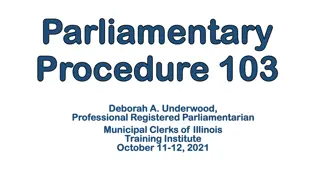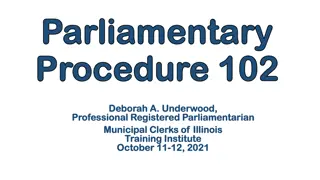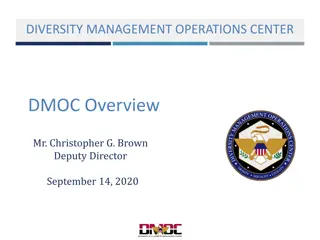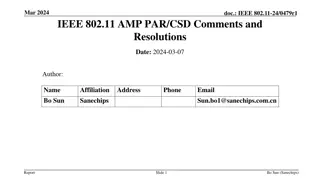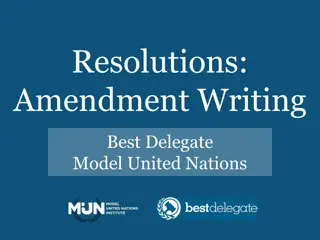Effective Tips for Writing Resolutions
Writing resolutions effectively requires attention to key factors like limiting the number of statements, conducting research on existing resolutions, structuring with clear introductions, avoiding ambiguity or personal attacks, ensuring Senate action feasibility, careful word choice, and reviewing past examples for guidance.
Download Presentation

Please find below an Image/Link to download the presentation.
The content on the website is provided AS IS for your information and personal use only. It may not be sold, licensed, or shared on other websites without obtaining consent from the author.If you encounter any issues during the download, it is possible that the publisher has removed the file from their server.
You are allowed to download the files provided on this website for personal or commercial use, subject to the condition that they are used lawfully. All files are the property of their respective owners.
The content on the website is provided AS IS for your information and personal use only. It may not be sold, licensed, or shared on other websites without obtaining consent from the author.
E N D
Presentation Transcript
Tips for Writing Resolutions Jackie and Javier
1. Four is the Limit: Resolutions cannot contain more than four whereas or resolved statements 2. Homework: The Student Senate has previous resolutions, and they are accessible for review on its web site, www.studentsenateccc.org, It is possible that a resolution already exists for the position you wish to take. Please review the existing resolutions first so that duplication can be avoided. 3. An Introduction: Consider using the first whereas as an introduction, outlining the situation in general or providing background and indicating the people or groups involved before justifying your resolutions in the other whereas statements.
4. Acronyms: Write out the names of groups or organizations in your first reference to them in your resolution. The full name may be followed by a parenthetical abbreviation, which you may then use for future references. 5. Make the Point: Be as direct and to the point as possible. Cleverness that makes a resolution less clear will likely cause that resolution to be defeated, amended, or referred. 6. Avoid Lumping: Limit yourself to one reason in support of or in defense of your resolution per whereas statement. Lumping too much into one statement causes confusion and is likely to provoke calls for revision.
7. Professionalism Preferred: Avoid personal attacks or insults of any person or group, even subtle ones. No matter how justified the statement or how offensive the target, such attacks will almost inevitably draw opposition from some members of the voting body. 8. Only Senate Action: Remember that resolutions can only direct the Student Senate to take action. The Student Senate does not have the authority to direct or require action from any other group or individual, including local senates. Your resolution can do such things as request or recommend actions from others, or it can endorse or support a position, but it can only direct action from the Student Senate itself.
9. Reality Check: If your resolution directs an action by the Senate, be certain that the action is possible for the Senate to accomplish. Specifically, remember that the Senate cannot absolutely ensure or prevent the actions of any other body. Some qualifying or alternative terms, such as work with [other body] to ensure rather than ensure, or oppose rather than prevent, may help to produce a more realistic resolution. 10. Word Choice: Judiciously use words such as any, every, all, never, none, or other qualifiers that make sweeping generalizations. 11. Models: You may benefit from reading some past examples of resolutions for ideas about structuring and phrasing your resolution.
12. Resolution Title: Be sure that the title of the resolution accurately reflects the content of the resolution. 13. Citing Legislation: Cite the dates on stated legislation or regulations included in the resolution, i.e. AB 1725 (1988) 14. Facts: Resolutions are best received when the focus is on facts versus rhetoric. 15. Hard and Soft Copy: Resolutions and amendments submitted at session in soft copy must be accompanied by a hard copy (printed versions are fine). 16. Amendments: Amendments are made to the original resolution (the main motion).
Advice on Wording for Resolutions Recommend: If using the word recommend within your resolution, be very clear and cautious about what you are recommending and to whom. Make certain that any recommendation is directed to a specific body with authority over the issue in question, and make certain that the Student Senate has standing to make such a recommendation. Ensure: If using this term, be certain that the Senate has the power to fulfill the goal of your resolution. The Senate may not have the power to ensure many outcomes, especially on its own. In many cases, better phrasing might ask the Senate to work in cooperation with another group to ensure or to accomplish the outcome.
Assert or Affirm: Assert and affirm imply that the Senate is taking a specific position on an issue, and these terms have often been used in resolutions relating to matters on which the Senate has not yet researched and developed a clear position. Be cautious about what stand you ask the Senate as a statewide body to take without proper discussion and foundation. It may also be the case that the Senate has taken a contrary position to one you now expect to affirm. Please take some time to review the resolutions listed on the Student Senate website to see if a prior position on your issue has been determined. After such a review, you then can decide if you want the Senate to
Reaffirm: If you ask the Senate to reassert or reaffirm a position, make certain that it is indeed a position that has been established previously and not an interpretation of or extrapolation from a previous Senate statement or document. Resolution Writing Guide, Page 3 In addition, make certain that such a reaffirmation is indeed necessary rather than repetitious. In general, reaffirming previous positions is discouraged due to the conflict that will arise if the body votes it down. Require: As with ensure, make certain that the Senate has the authority to require the action in question. In many cases, the Senate may not have the power to fulfill the action requested
Support Directions to support local senates, other organizations, documents, and more, are acceptable as desired actions of the Senate. It is worth noting that the Student Senate does not have the wherewithal to financially support individuals or organizations, but resolutions may direct the Senate to support funding from the state or other source for colleges, programs, etc.
Work with When directing the Senate to work with another official body, be certain that the body in question has appropriate involvement in or authority regarding the issue at hand. Often, the action work with is followed by another direction to accomplish something. Consider which is more important to the intent of your resolution: that the Senate work with another group or that the action is accomplished? Then word your resolution in the manner that best emphasizes the goal you most wish to accomplish.
Verbs you might consider whether calling for one of these actions would make your resolution more likely to be well-received by the delegates: 1. Urge 2. Research 3. Develop (a position, materials, a paper, etc.) 4. Distribute 5. Oppose 6. Publish 7. Survey 8. Encourage 9. Conclude
Verbs (continued) 10. Adopt 11. Request 12. Express 13. Form 14. Collect 15. Communicate 16. Recognize




